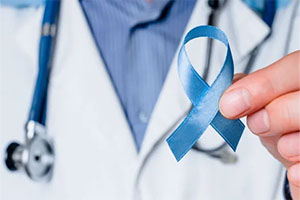Sure Signs You Have Prostate Cancer
Nov 16, 2022
Cancer is the second leading cause of death in the United States behind heart disease and prostate cancer is one of the most common types for men. The American Cancer Society estimates, "268,490 new cases of prostate cancer" and almost 35,000 people will die. While that's an alarming number, the good news is not only is prostate cancer successfully treatable, it can be curable according to Dr. Mahdi Taha, Medical Director of Medical Oncology at Delray Medical Center, Part of the Palm Beach Health Network who shares what to know about prostate cancer and symptoms to watch out for.
What Should People Know About Prostate Cancer?
 Dr. Taha says, "1 in 8 males will develop Prostate Cancer in their lifetime. It is prudent and imperative that they be screened once they meet the requirements. This form of screening is a simple blood test, Prostate Specific Antigen (PSA), which can be part of your annual routine blood workup panel with your primary care doctor or any physician or clinician. With no risk factor, at the age of 50, it is recommended that men begin their annual screening. If you're African American, it is recommended you start at age 45. If you have a strong family history of prostate cancer, it's recommended that you start screening 10 years before that initial diagnosis of that primary family member, or at age 50, whichever comes first. For example, if your father was diagnosed at 47, you should get the Prostatic Specific Antigen at age 37."
Dr. Taha says, "1 in 8 males will develop Prostate Cancer in their lifetime. It is prudent and imperative that they be screened once they meet the requirements. This form of screening is a simple blood test, Prostate Specific Antigen (PSA), which can be part of your annual routine blood workup panel with your primary care doctor or any physician or clinician. With no risk factor, at the age of 50, it is recommended that men begin their annual screening. If you're African American, it is recommended you start at age 45. If you have a strong family history of prostate cancer, it's recommended that you start screening 10 years before that initial diagnosis of that primary family member, or at age 50, whichever comes first. For example, if your father was diagnosed at 47, you should get the Prostatic Specific Antigen at age 37."
How to Help Lower the Risk of Prostate Cancer
 Dr. Taha emphasizes, "Early detection is important. Being screened on an annual basis is important. It is easily treated if you catch it early. Prostate cancer is not due to environmental factors or associated with a certain lifestyle issue like smoking or drinking. Awareness is key. To lower your risk, it is important to be aware of signs that something abnormal may be going on. Prostate cancer is mainly due to family history. Being active and living a more health-conscious lifestyle can help lower the risk as well."
Dr. Taha emphasizes, "Early detection is important. Being screened on an annual basis is important. It is easily treated if you catch it early. Prostate cancer is not due to environmental factors or associated with a certain lifestyle issue like smoking or drinking. Awareness is key. To lower your risk, it is important to be aware of signs that something abnormal may be going on. Prostate cancer is mainly due to family history. Being active and living a more health-conscious lifestyle can help lower the risk as well."
Prostate Cancer Can Be Curable
 According to Dr. Taha, "Prostate Cancer is a very treatable and curable disease. There are so many options available to patients, which is great. Some options include radical prostatectomy, which is a surgery to remove the entire prostate gland and surrounding lymph nodes.There are multiple types of therapies including radiation therapy, like external beam radiation or CyberKnife radiotherapy. There is also a Cryotherapy or High Intensity Frequency Ultrasound (HIFU) – both used to treat low risk cases. I strongly recommend a multidisciplinary approach when diagnosed. It's important to seek care with a Medical oncologist, Urologist and radiation oncologist involved to be involved with the treatment of your care."
According to Dr. Taha, "Prostate Cancer is a very treatable and curable disease. There are so many options available to patients, which is great. Some options include radical prostatectomy, which is a surgery to remove the entire prostate gland and surrounding lymph nodes.There are multiple types of therapies including radiation therapy, like external beam radiation or CyberKnife radiotherapy. There is also a Cryotherapy or High Intensity Frequency Ultrasound (HIFU) – both used to treat low risk cases. I strongly recommend a multidisciplinary approach when diagnosed. It's important to seek care with a Medical oncologist, Urologist and radiation oncologist involved to be involved with the treatment of your care."
Blood in Your Urine
 "If you notice blood in your urine, get a urological examination," Dr. Taha says. "What this means is the mass that has developed, a cancerous mass, is bleeding and it is getting into your bloodstream. Consult with your primary or urologist. You should get a PSA blood test and/or digital rectal exam."
"If you notice blood in your urine, get a urological examination," Dr. Taha says. "What this means is the mass that has developed, a cancerous mass, is bleeding and it is getting into your bloodstream. Consult with your primary or urologist. You should get a PSA blood test and/or digital rectal exam."
Urinary Frequency
 Dr. Taha tells us, "This is the second most common symptom. Many men at the age of being diagnosed with prostate cancer also tend to urinate more frequently. But this is the most common sign for people who have prostate cancer. If you go frequently, you should get evaluated. It could mean you have an enlarged mass that is causing you to urinate more frequently."
Dr. Taha tells us, "This is the second most common symptom. Many men at the age of being diagnosed with prostate cancer also tend to urinate more frequently. But this is the most common sign for people who have prostate cancer. If you go frequently, you should get evaluated. It could mean you have an enlarged mass that is causing you to urinate more frequently."
Joint or Bone Pain
 Dr. Taha explains, "If you notice that you are having joint or bone pain in a specific area, mainly in the back or pelvis, you should get screened. One of the most common areas that prostate cancer spreads to is the bone. Oftentimes, patients who go in to see their doctor because of joint or bone pain will be diagnosed with prostate cancer. This means it has already moved to the bones and has been harboring and festering within."
Dr. Taha explains, "If you notice that you are having joint or bone pain in a specific area, mainly in the back or pelvis, you should get screened. One of the most common areas that prostate cancer spreads to is the bone. Oftentimes, patients who go in to see their doctor because of joint or bone pain will be diagnosed with prostate cancer. This means it has already moved to the bones and has been harboring and festering within."

